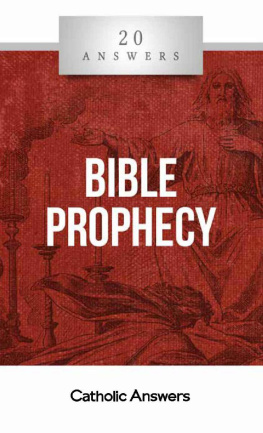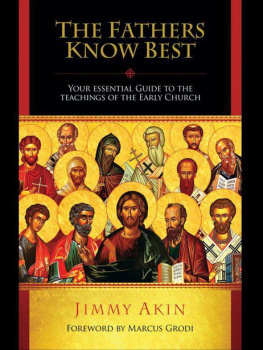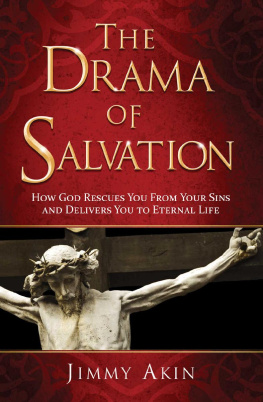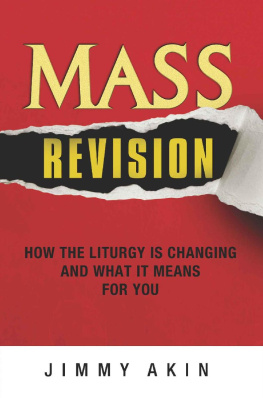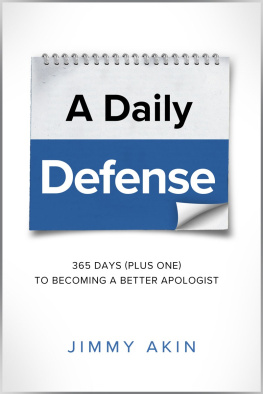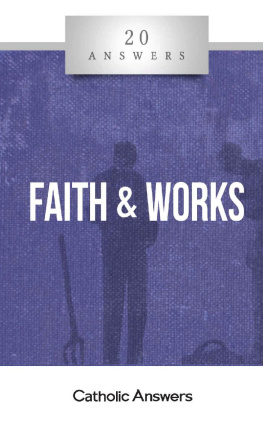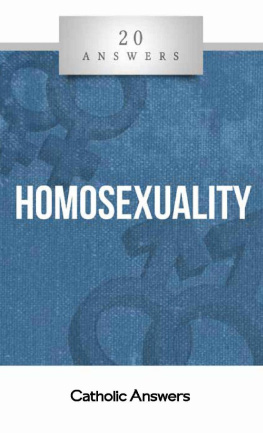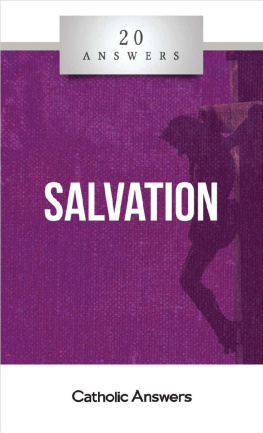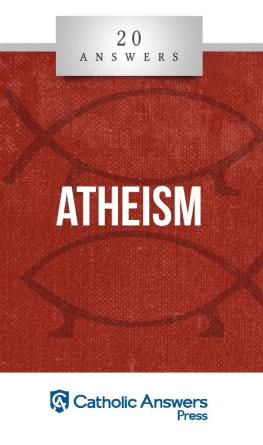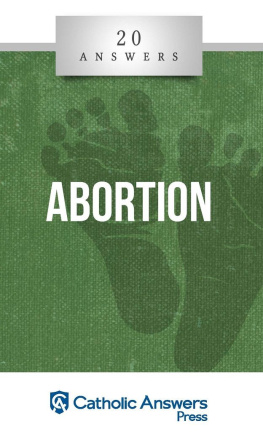Jimmy Akin - 20 Answers- Bible Prophecy (20 Answers Series from Catholic Answers Book 25)
Here you can read online Jimmy Akin - 20 Answers- Bible Prophecy (20 Answers Series from Catholic Answers Book 25) full text of the book (entire story) in english for free. Download pdf and epub, get meaning, cover and reviews about this ebook. year: 2018, publisher: Catholic Answers Press, genre: Religion. Description of the work, (preface) as well as reviews are available. Best literature library LitArk.com created for fans of good reading and offers a wide selection of genres:
Romance novel
Science fiction
Adventure
Detective
Science
History
Home and family
Prose
Art
Politics
Computer
Non-fiction
Religion
Business
Children
Humor
Choose a favorite category and find really read worthwhile books. Enjoy immersion in the world of imagination, feel the emotions of the characters or learn something new for yourself, make an fascinating discovery.
- Book:20 Answers- Bible Prophecy (20 Answers Series from Catholic Answers Book 25)
- Author:
- Publisher:Catholic Answers Press
- Genre:
- Year:2018
- Rating:4 / 5
- Favourites:Add to favourites
- Your mark:
- 80
- 1
- 2
- 3
- 4
- 5
20 Answers- Bible Prophecy (20 Answers Series from Catholic Answers Book 25): summary, description and annotation
We offer to read an annotation, description, summary or preface (depends on what the author of the book "20 Answers- Bible Prophecy (20 Answers Series from Catholic Answers Book 25)" wrote himself). If you haven't found the necessary information about the book — write in the comments, we will try to find it.
Jimmy Akin: author's other books
Who wrote 20 Answers- Bible Prophecy (20 Answers Series from Catholic Answers Book 25)? Find out the surname, the name of the author of the book and a list of all author's works by series.
20 Answers- Bible Prophecy (20 Answers Series from Catholic Answers Book 25) — read online for free the complete book (whole text) full work
Below is the text of the book, divided by pages. System saving the place of the last page read, allows you to conveniently read the book "20 Answers- Bible Prophecy (20 Answers Series from Catholic Answers Book 25)" online for free, without having to search again every time where you left off. Put a bookmark, and you can go to the page where you finished reading at any time.
Font size:
Interval:
Bookmark:
20 Answers
Bible Prophecy
Jimmy Akin

20 Answers: Bible Prophecy
Jimmy Akin
2017 Catholic Answers
All rights reserved. Except for quotations, no part of this book may be reproduced or transmitted in any form or by any means, electronic or mechanical, including photocopying, recording, uploading to the internet, or by any information storage and retrieval system, without written permission from the publisher.
Published by Catholic Answers, Inc.
2020 Gillespie Way
El Cajon, California 92020
1-888-291-8000 orders
619-387-0042 fax
catholic.com
Printed in the United States of America
978-1-68357-063-9
978-1-68357-064-6 Kindle
978-1-68357-065-3 ePub
Table of Contents
Introduction
At one point in the oracles of the book of Isaiah, God declares, I am God, and there is none like me, declaring the end from the beginning and from ancient times things not yet done (46:910).
Bible prophecy is endlessly fascinatingfor me as much as anyone else.
I grew up in the 1970s, when Hal Lindseys end times bestseller The Late, Great Planet Earth was all the rage. With the threat of imminent nuclear destruction hanging over us every minute during the Cold War with the Soviet Union, the subject of how the world ends was on everybodys mind. Prophetic books like Revelation and Daniel were the first books of the Bible I ever read.
With time, I discovered that there was more to Bible prophecy than I initially thought. The discoveries that ensued eventually led me to write this short book, so I could share them with you.
There are many books on Bible prophecy, but few are like this one. Most make three principal mistakes:
1. They assume a particular school of thought known as dispensational premillennialism . Ill be telling you about this view and why its mistaken (see Answer 3).
2. They tend to assume that prophetic passages are about events that lie in our future. While the prophets did make predictions, we live at a much later date, and the predicted events may be in their future but in our past.
3. The above point leads authors to ignore much of Bible prophecy. We shouldnt ignore the Bibles track record of fulfilled prophecy.
In this short book, I hope to give you a sense of what Bible prophecy is and how it works. I want to give you a birds-eye view of the overall sweep of the subject, including both prophecies that God has fulfilled and those that yet await us.
1. What is Bible prophecy?
Today we think of prophecy as a near synonym for prediction. If someone makes a prophecy, he is issuing a prediction about the future.
The biblical prophets did often make predictions, but that was only part of what they did.
The Greek word prophet ( prophts ) comes from roots that indicate a person who speaks in front of a group of people ( pro- in front of + phts speaker). If we were to give it a fresh translation into English, spokesman would be a good equivalent.
Thats what the prophets were: Gods spokesmen. As a result, they were tasked with giving people whatever message God wanted delivered, whether or not that message had to do with the future.
Sometimes people even wanted prophets to reveal information about things that had happened in the past . Thus, when Jesus opponents were mocking him, they first blindfolded and then slapped him, saying, Prophesy! Who is it that struck you? (Luke 22:64).
God wasnt interested in satisfying facetious demands like that one, but he was interested in warning his people against sinand thats what the biblical prophets did much of the time. Warning Israel against its sinsidolatry, bloodshed, oppression of the poorwas one of the principal tasks of the biblical prophets. Of course, warning people about sin involves warning them about what will happen if they dont repent, and so the prophets also discussed future events.
In the Old Testament, the focus was not on what the consequences of sin would be in the next life, but on what they would be in this one. The prophets regularly warned people about this-worldly consequences like famines, diseases, and military invasions. These were consequences God would allow if people persisted in their sins.
God also promised rewards if people acted in a moral manner. If they turned from idols, bloodshed, and oppression, he would give them prosperity, health, and peace and security. He also revealed that, even when they were being chastised for their sin, he still loved them and thatonce they did repenthe would show mercy and bring times of blessing again.
On other occasions, when a particular danger threatenedsuch as a military invasion by a powerful enemyhe would assure them he would protect them and that the invasion would not succeed.
In all these ways, God acted as a father toward Israel, warning his children of the consequences of bad behavior, promising rewards for good behavior, reassuring them of his love even amid discipline, and assuaging their fears.
Through all of this, the prophets acted as Gods spokesmen, delivering these messages to the children of Israel.
The prophets had a privileged place in Gods plan, as shown by his warnings against turning to other figures who also claimed to reveal hidden knowledge. The Old Testament warns against any one who practices divination, a soothsayer, or an augur, or a sorcerer, or a charmer, or a medium, or a wizard, or a necromancer (Deut. 18:1011). These individuals claimed to give people information from supernatural sources, but they werent getting it from God. Consequently, God warned the Israelites through Moses to listen only to his authorized spokesmen, telling them: The Lord your God will raise up for you a prophet like me from among you, from your brethrenhim you shall heed (18:15). He also gave them tests they could use to tell true prophets from false ones (Deut. 13:15; 18:2022).
Because the focus of prophecy, especially in the Old Testament, tended to be on the consequences of good and bad behavior in this life, prophecies often had a shorter time frame for fulfillment than we today might expect.
We know that prophecy often has to do with the future, and so we can mistakenly assume that a given prophecy has to do with our future. But usually the prophets warned their audience of consequences that would happen sooneither in their own generation or within a few generations of when the prophecy was given. This is a theme we will see repeatedly.
2. Who were the biblical prophets?
There were a large number of prophets in biblical times.
For example, we are told that when the wicked queen Jezebel was killing the prophets of the Lord, a man named Obadiah (not the prophet of the same name) took a hundred prophets and hid them by fifties in a cave (1 Kings 18:4).
Imagine that! There were at least a hundred prophets living at this one time! Yet we know nothing about them as individuals.
Moses is the most famous Old Testament prophet, though we often dont think of him that way because of his special role as Israels lawgiver.
The prophets most familiar to us today include Isaiah, Jeremiah, Ezekiel, and Daniel. Together, they are known as the major prophets and they have something in common: they all wrote lengthy books that are part of the Bible.
There were also the twelve minor prophets. Their books are shorter, and they include figures like Hosea, Joel, and Jonah. In the ancient world, they were often simply called the Twelve, and their books were written in a single scroll, which was also called the Twelve.
We will have sections on each of the major and minor prophets later (see Answers 1014).
Sometimes these prophets are referred to as literary prophets because they recorded their prophecies in writing. However, the literary prophets whose books are in the Bible today are not the only literary prophets there were. We know that there were others who also wrote books. For example, various passages in the Old Testament refer to books written by prophets such as Nathan, Gad, Abijah, Shemaiah, and Iddo (1 Chron. 29:29; 2 Chron. 9:29; 12:15).
Next pageFont size:
Interval:
Bookmark:
Similar books «20 Answers- Bible Prophecy (20 Answers Series from Catholic Answers Book 25)»
Look at similar books to 20 Answers- Bible Prophecy (20 Answers Series from Catholic Answers Book 25). We have selected literature similar in name and meaning in the hope of providing readers with more options to find new, interesting, not yet read works.
Discussion, reviews of the book 20 Answers- Bible Prophecy (20 Answers Series from Catholic Answers Book 25) and just readers' own opinions. Leave your comments, write what you think about the work, its meaning or the main characters. Specify what exactly you liked and what you didn't like, and why you think so.

